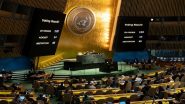New Delhi, Oct 21 (PTI) The UN Biodiversity Conference COP16 will focus on four key areas of assessing progress on the Kunming-Montreal Global Biodiversity Framework, recognising the crucial role of indigenous peoples, finalising a resource mobilisation strategy and operationalising mechanisms for digital sequence information on genetic resources, a senior UN official said.
The United Nations Biodiversity Conference (COP16) kicked off on Monday in Colombia, bringing together environmental leaders from nearly 200 countries, including India, to assess progress on historic commitments to halt and reverse biodiversity loss.
India has updated its national plan to protect biodiversity in alignment with the Kunming-Montreal Global Biodiversity Framework which will be released at the biannual UN Biodiversity Conference.
One of the main goals of the KM-GBF is to protect at least 30 per cent of the world's land and oceans by 2030.
Also Read | NEET-UG Controversy: Supreme Court Grants 2 Weeks More Time to Expert Panel for Submission of Report.
India updated its National Biodiversity Strategies and Action Plans to align it with the new goals and targets set by the Kunming-Montreal Global Biodiversity Framework (KM-GBF), adopted at the UN Biodiversity Conference (COP15) in Montreal, Canada, an official said.
Indian officials, however, said protecting 30 per cent of land and oceans is a collective global goal and not a national goal.
With over 23,000 delegates expected, COP 16 will be the largest gathering under the Convention on Biological Diversity (CBD) to date.
Astrid Schomaker, Executive Secretary of the CBD, emphasised the significance of the event, stating, "It's the biggest conference in the history of the Convention. It includes three major meetings: the 16th Conference of the Parties (COP 16) to the CBD, the 11th meeting of the Cartagena Protocol on Biosafety, and the 5th meeting of the Nagoya Protocol on access to genetic resources."
A major agenda item will be assessing the implementation of the KMGBF, adopted during COP 15 in 2022.
This framework outlines 23 action targets aimed at reversing biodiversity loss by 2030.
"Although 107 countries have submitted aligned national biodiversity targets, there's still much to be done," said Schomaker.
"Progress is happening, but it needs to accelerate. We're expecting critical submissions, including Colombia's launch of its National Biodiversity Strategy and Action Plan during the conference."
Indigenous peoples and local communities are expected to play a pivotal role at COP 16, which will consider a new work program under Article 8(j) of the Convention to enhance their involvement in conservation efforts.
Schomaker highlighted their importance: "Indigenous peoples are the primary guardians of nature. Their knowledge is essential to biodiversity conservation, and we will be discussing new institutional arrangements to better incorporate their role."
Resource mobilisation will be another key priority, as the financial gap to achieve global biodiversity targets remains vast, despite significant donations like the $5.5 billion pledged by the Bezos Earth Fund.
"We'll be debating whether to strengthen existing institutions or create a new global biodiversity fund," Schomaker explained, adding, "Much is happening, but far more is needed to bridge the funding gap."
Another major focus will be operationalising the multilateral mechanism for digital sequence information (DSI) on genetic resources.
This system, adopted at COP 15, is designed to ensure equitable benefit-sharing from the use of genetic resources.
Schomaker acknowledged its complexity: "This fund is about giving back to nature when we profit from genetic resources and supporting those who protect these resources."
The conference, which will feature Colombia's theme of "Peace with Nature", will also host over 1,000 events in the Green Zone, showcasing community-driven biodiversity initiatives. Schomaker praised Colombia's contributions, stating, "The Green Zone in Cali is the largest in the convention's history and exemplifies a whole-of-society approach to advancing biodiversity action."
"This is no longer just an environmental issue; it's a social and equity crisis, with biodiversity loss and climate change fueling conflicts and displacement," Schomaker warned. "We must respond to this planetary crisis, and COP 16 is our opportunity to chart a path toward living in harmony with nature."
(This is an unedited and auto-generated story from Syndicated News feed, LatestLY Staff may not have modified or edited the content body)













 Quickly
Quickly
















